29 May 2020
UK still staying home and even coming to terms with lockdown
Many are continuing to not leaving their homes, reflecting real caution at lifting restrictions

A major new study of the UK public by King’s College London in partnership with Ipsos MORI finds that the public claim to be sticking to the “stay at home” advice to an extraordinary degree, even after the government relaxed the rules, reflecting their real caution at lifting restrictions and continued focus on the health impacts over effects on the economy and education.
The study is based on 2,254 interviews with UK residents aged 16-75, and was carried out online between 20 and 22 May 2020. Some of these latest results are compared with findings from a similar survey conducted between 1 and 3 April 2020.
Download the full report for charts and detailed analysis
1. Still staying home – and coming to terms with lockdown
Despite the UK government changing its official advice and messaging from “stay home” to “stay alert”, significant proportions of the public – including children – are still not leaving their home for very long periods, indicating the seriousness with which people are still treating the crisis. At the same time, people seem to be adapting to life under lockdown.
- 41% of adults say they did not leave their home on five or more of the previous seven days leading up to this latest survey, and 46% of parents say the same applies to their children.
- 1 in 7 adults (14%) did not leave their home once in the previous week, and 23% of parents say their children did not leave home once either.
- Just 15% of people had left their home every day over the same period.
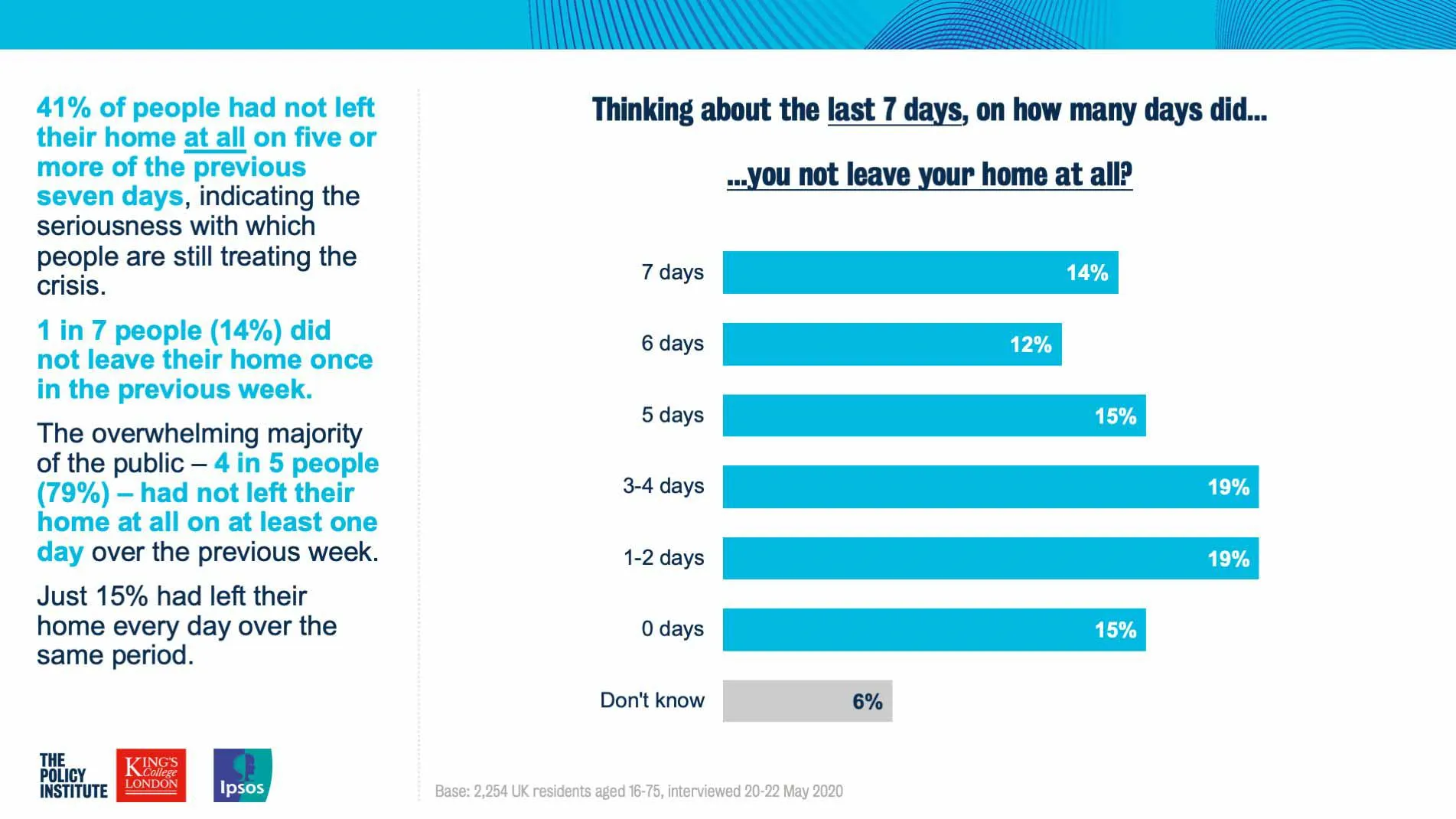
- People are more likely to think they can cope with the measures compared with the beginning of April: 38% say the current measures will not become extremely difficult to cope with, up from 26% in the second week of lockdown. However there has also been a small rise in those who say they are already finding it extremely difficult, up from 15% to 20%.
- Just over half, 53%, say they are finding the coronavirus stressful, down 11 points from 64% in early April.
- 49% say the statement “There are some aspects of the ‘lockdown’ measures that I’ve enjoyed” is closer to their view, compared with 26% who say “There are no aspects of the ‘lockdown’ measures that I’ve enjoyed” is closer.
2. Compliance with official guidance and rules
Compared with six weeks ago, compliance with several key rules and pieces of guidance remains very high and virtually unchanged:
- Obeying the 2-metre distance rule: 92% now vs 94% then.
- Hand-washing more often, for 20 seconds: 90% now vs 93% then.
- Covering your mouth when you cough: 89% vs 90% then.
- Avoiding public transport: 82% now vs 80% then.
But there have been two significant changes since the beginning of April:
- 14% have now had friends or family visit them at home, triple the 5% who had previously done the same.
- 38% have now been wearing face masks, double the 19% who had worn them six weeks ago.
And many are also taking steps that are not part of the government’s advice, such as:
- Washing or disinfecting items they bring home (55%).
- Changing or washing clothes when they return home (38%).
- Wearing gloves outside (31%).
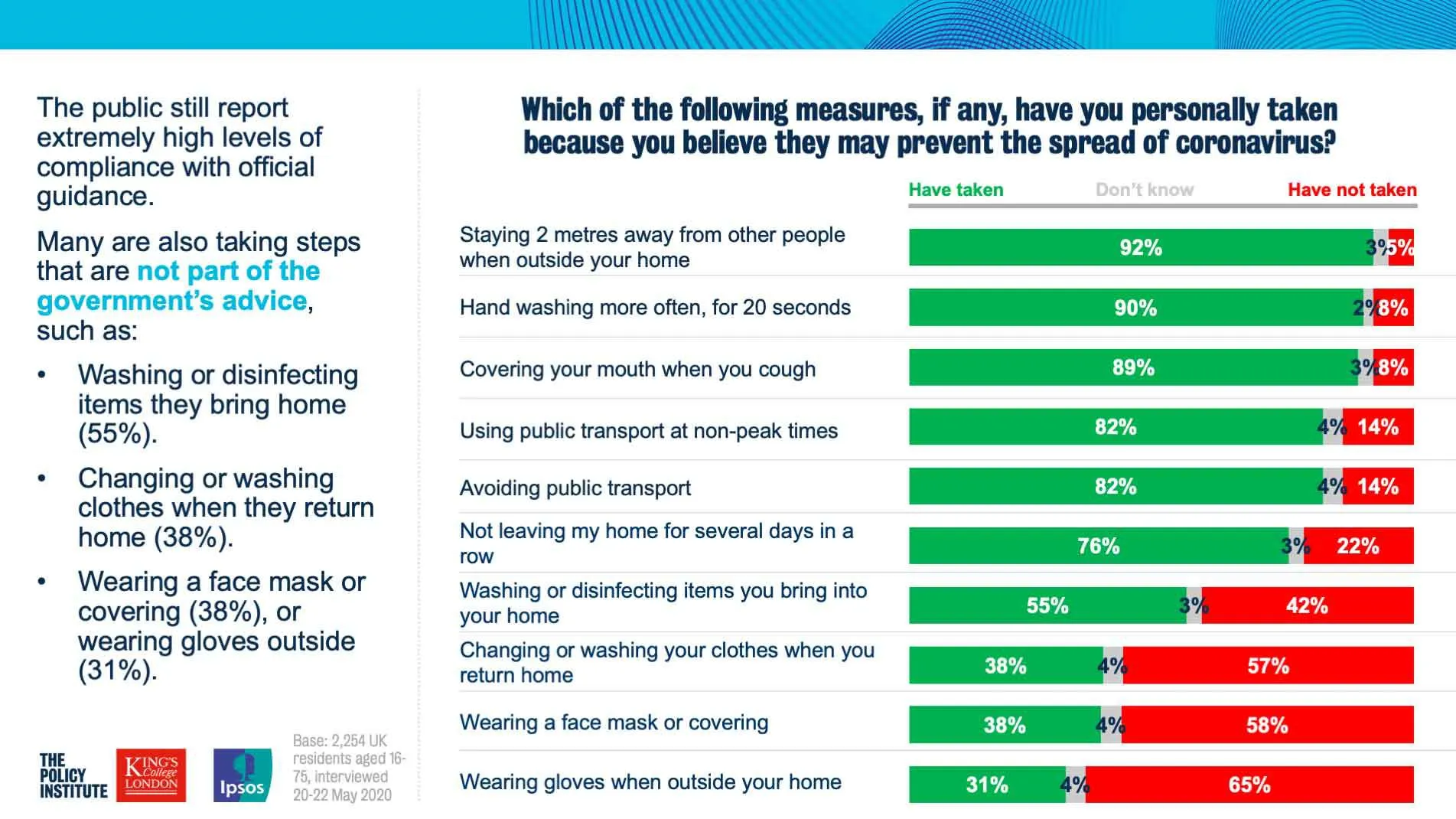
3. Saving lives still the priority over wider impacts
Continued high compliance with the rules reflects the order in which the public place different impacts in terms of seriousness (% who say each is top or second top priority):
- Increased deaths from Covid-19 (64%).
- Increased deaths from other conditions due to fewer healthcare resources (52%).
- Impacts on the economy and jobs (38%).
- Increased mental health issues (22%).
- Impacts on children and their education (17%).
And the direct health impact of the virus in general seems to be a growing concern:
- People now give put their chances of being hospitalised if they catch Covid-19 at 40% (median guess), up from 30% at the beginning of April. It is not yet known what the hospitalisation rate is, but the Imperial College model that helped lead to the lockdown assumed a rate of 4.4%, based on other countries’ experience. The public therefore now think the chance of hospitalisation is nearly 10 times as high as this.
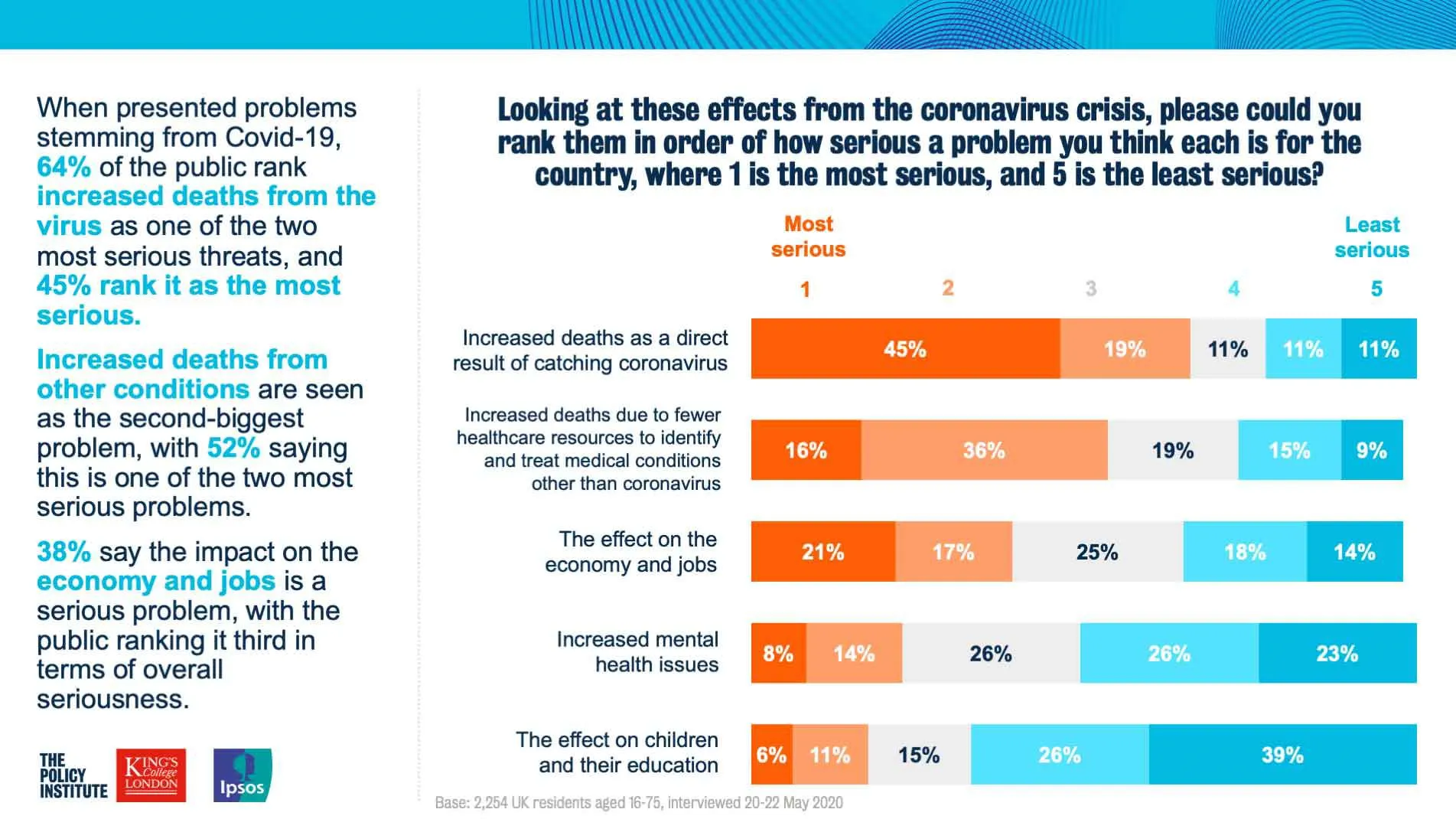
4. Mixed picture with regard to economic threat
- 13% now say they are certain or very likely to face significant financial difficulties because of the coronavirus, down from 18% six weeks ago.
- While 3 in 10 people (28%) have had to cut back on non-essential spending, 2 in 10 (21%) have had more money left at the end of the month.
- 20% of workers now think they are fairly likely to lose their jobs, up from 14% in early April – but 10% now say they are certain or very likely to, virtually unchanged from the 12% who said this six weeks ago.
- While 30% have experienced reductions in their income, relatively few have been unable to afford food or other essential items (6%) or could not afford to pay their rent or mortgage (5%).
However, more people (47%) think coronavirus will exacerbate inequality in the UK than think it won’t have an effect (37%).

5. But many are still suffering
- 48% report putting on weight, and 29% now say they have drunk more alcohol than they normally would, up from 19% in early April.
- 43% have felt more lonely than usual, compared with 16% who have felt less lonely.
- 20% say the lockdown measures are already extremely difficult to deal with, up from 15% six weeks ago.
Many have also experienced knock-on health impacts from coronavirus:
- 35% say they have postponed seeking medical advice or treatment unrelated to Covid-19.
- And 17% say that they’ve had to delay or cancel treatment due to coronavirus disruption.
- These findings may be linked to the perception among 14% of the public that they should not be contacting the NHS, even if they are ill.
And tensions may be surfacing related to the enforcement of the lockdown:
- 17% say they have confronted someone for not following the recommended measures, while smaller minorities have been confronted themselves (9%), or have reported someone to the authorities (8%).
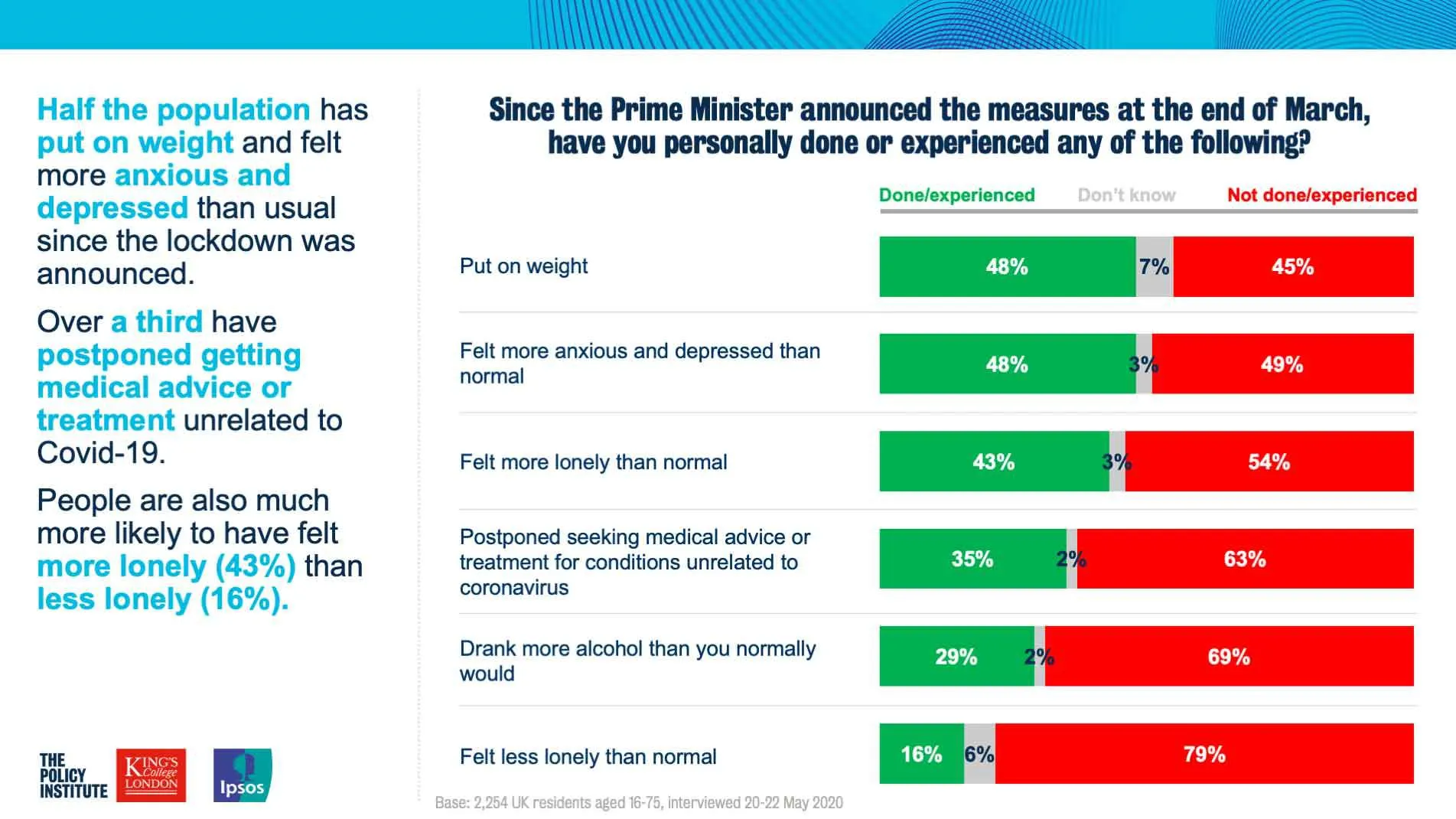
6. The future under Covid-19
We’re relatively split on some aspects of how to live long-term with the virus if a vaccine or treatment can’t be found, with education in particular a potential flashpoint:
- In this scenario, 50% think it would be acceptable for most children to be home-schooled over the very long term, compared with 37% who do not.
- Three in five (62%) think it would be acceptable for parents to decide whether their children goes to school or not.
- Slightly more people find it unacceptable (45%) than acceptable (41%) that parents could have to follow government instructions on when their children return to school.
- 48% think it would be acceptable for people themselves to decide whether to attend live sporting or cultural events, compared with 41% who think it would not. And 65% would find it acceptable if no major sporting or cultural events were allowed to take place in front of a live audience.
- 76% say it would be acceptable to force bars and restaurants to continue social distancing over the very long term, versus 17% who disagree. 38% would find it acceptable if restaurants and bars were allowed to choose whether or not to enforce social distancing.
And increasing numbers think we are in it for the long haul with this crisis:
- 30% now expect life won’t return to normal for two or more years, up from 9% six weeks ago.
- The proportion who think the crisis will largely all be over within six months has fallen from 41% in early April to 23% now.
- 1 in 10 people now think it will be over two years before we can vaccinate the population against Covid-19 – twice as many as in the previous survey.
- The proportion who think a vaccine will take 18 months or less has fallen from 73% to 62%, while the proportion who think it will take 12 months or less has declined from 46% to 41%.
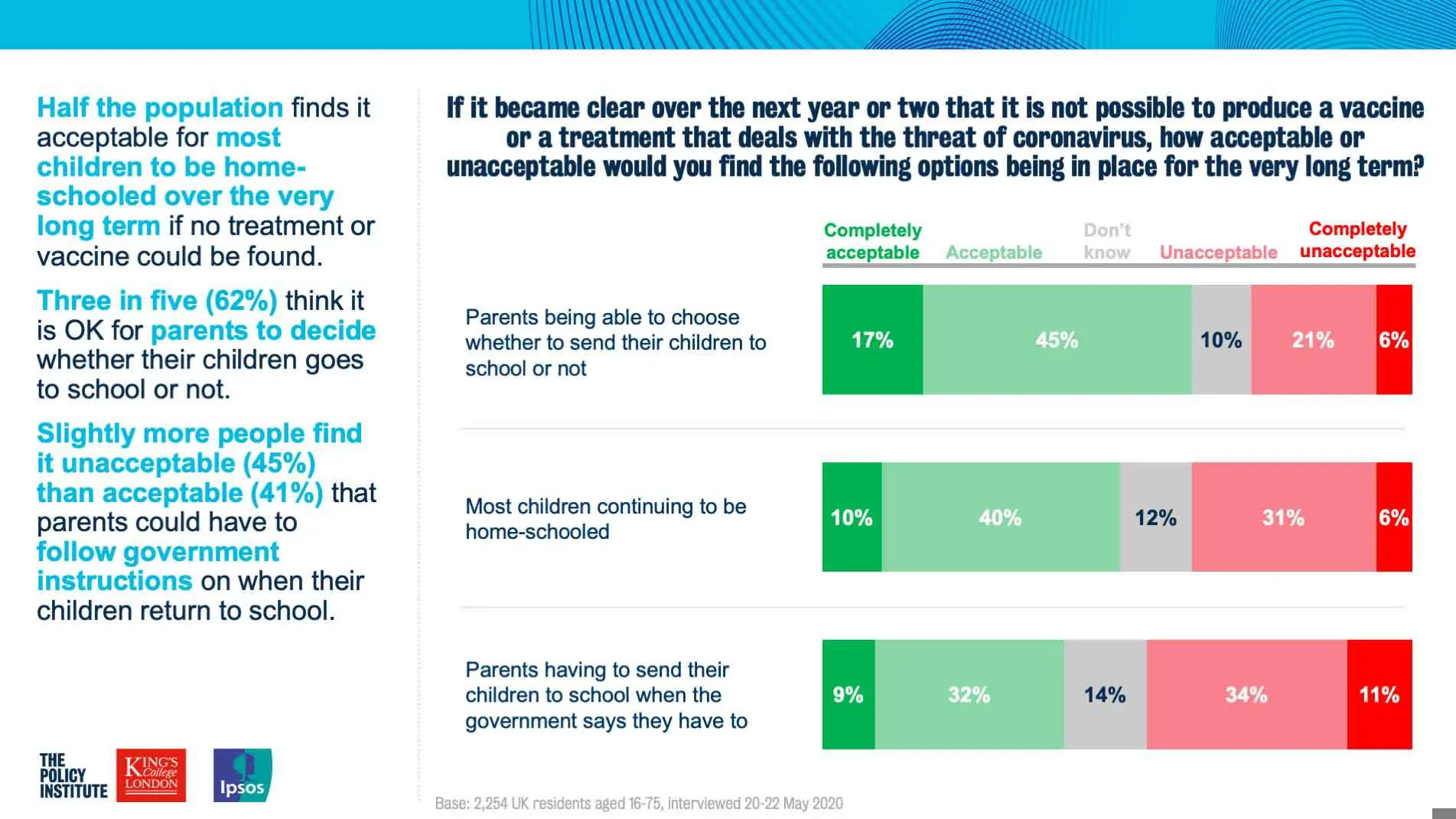
Professor Bobby Duffy, Director of the Policy Institute at King’s College London, said:
“The UK government’s advice may have shifted to ‘stay alert’, but it’s the ‘stay at home’ message that the public are continuing to follow. That four in ten people did not leave their home for five or more of the previous seven days, with one in seven not leaving their home at all, indicates the seriousness with which the public are still treating the Covid-19 crisis.
“Despite warnings of the economic consequences of continued lockdown, the public say health should still be the priority – and this is seen in the extremely high levels of compliance with official guidance, as well as the fact that many are taking extra steps, such as the 55% who are washing or disinfecting items they bring home.
“The public’s continued focus on saving lives and protecting health means the government may struggle to coax some people out of lockdown when the rules are eased further. We’ve gone from just 26% of people saying that the measures to control the virus will never become extremely difficult for them at the start of April, to 38% of people saying the same now.
“We’re also coming to terms with being in this for the long haul. If a vaccine or treatment is not found in the next couple of years, half of people say it would be acceptable to them for most children to continue to be home-schooled for the very long-term, which would be an extraordinary societal shift in how we raise and educate our kids.”
Gideon Skinner, Research Director at Ipsos MORI, said:
“This extensive and detailed study of public opinion and behaviours during the crisis shows that the public are taking the coronavirus very seriously. As well they might – quite apart from the direct risks, the crisis is having an impact for many people on their financial and mental health too (even though people tend to worry more about others than for themselves).
Nevertheless, the British public is showing signs of resilience. Not just in keeping to the rules, but also in looking for positives, and engaging in pro-social behaviours like helping others or clapping for carers. However, while many are preparing for the long-term, uncertainty continues, and the full impact of the changes the crisis might bring are still to be completely understood.”
Download the full report for charts and detailed analysis
Technical details
Ipsos MORI interviewed a sample of 2,254 adults aged 16-75 in the UK using its online i:omnibus between 20 and 22 May 2020 (including 191 in Scotland and 109 in Wales) and a sample of 2,250 adults aged 16-75 between 1 and 3 April. Data has been weighted to the known offline population proportions for age within gender, government office region, working status, social grade and education. All surveys are subject to a range of potential sources of error.
